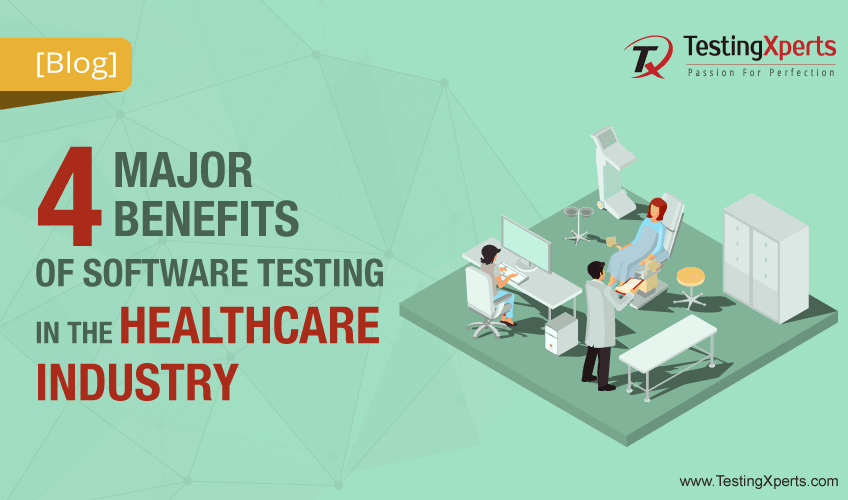Recommended Blogs
4 Major Benefits of Software Testing in the Healthcare Industry

Contents
- 4 major benefits of software testing in the healthcare industry
- Testing Healthcare Applications Challenges
- How TestingXperts Can Help!?
Digitalization, being one of the major revolutions seen by this industry, has been helping experts to deliver their services even from a distance. The growing number of healthcare products, such as wearables and the applications associated with them, have created a huge market and had a remarkable effect on the economy.
In fact, over the course of relatively few years, the healthcare and insurance markets have seen rapid, fundamental changes. Some of the changes have been listed below. Thus, healthcare products have the prerequisite to provide precision and accuracy, which has created the need for an extensive healthcare application testing. Software testing is a concept that covers all aspects that can individually impact the quality of the product.
4 major benefits of software testing in the healthcare industry:
Application Security
The sensitive data of patients, including their health info, requires a lot of protection. Healthcare application, if not given proper security, can lead to major breaches. In order to make the application secure and fail-safe, security testing is imperative. It helps in making the application sustainable and foolproof in all sorts of challenging situations.
Effective Execution and Expertise
In order to serve the patients better and effectively, expertise and efficiency are much needed in healthcare systems. Seeing the complex nature of the healthcare applications, it is important to ensure that they function smoothly without any disruptions. Software testing ensures that the application works seamlessly, providing a comprehensive experience to the users.
Big Data Handling
Healthcare industry comprises of a huge amount of data, containing extensive patient information and their respective health conditions. This data holds high importance to the healthcare institutions, as it helps in developing the right strategy and producing relevant products. Big data solutions help in providing informed decisions involving disease cure, research and development, and much more. It is imperative that this data gets tested for a flawless implementation – leading to expected outcomes.
Usability Testing
Usability Testing is crucial to building various user scenarios and features that are faced by the doctors and other staff during their working hours. In usability testing, the same instances are emulated and checked in real-time as well as virtually. These days, automation has made this task easier for testers as it simplifies the whole process. Usability testing also helps in enhancing the user interface and overall experience of the healthcare applications.
However, the new monitoring tools and approaches are posing unexpected challenges and making it more and more difficult to test the healthcare applications. Given below are some challenges that are regularly faced while testing healthcare applications.
Testing Healthcare Applications Challenges
1. Domain and System Understanding
Testers should have appropriate knowledge of the functionality, the clinical usage and the environment in which the software will be used while testing healthcare applications.
2. Security and Vulnerabilities
The healthcare application requires proper security to keep the patient’s records and other confidential data safe. The health app also contains financial data which needs proper security. Testers need to keep the data safe and secure to prevent any hack.
3. Cross Dependency of Software
Complex software has various layers and components. Any change in one component or layer can lead to cause side effects on the other. Testers must ensure that there are no side effects on the other layers whenever any change is made.
Testing in the healthcare industry requires agility and more experienced testers. They must be rigorous and experienced in regards to data integrity, data scrubbing and database queries. In addition, they must be able to leverage automation to generate data and AI to alleviate the risks associated with testing in the healthcare industry.
The healthcare industry has entered the dynamic era of new regulations and therapies that require a change in the line of work. TestingXperts, with its excellent domain knowledge, assures clients of one-stop testing services. Our strong QA and test automation capabilities, ideal for testing their enterprise applications and technology infrastructure, is helping our clients in producing world-class health applications.
Our in-house test labs have the necessary talent and infrastructure capable of performing multifaceted and complex testing activities, including R&D software testing, healthcare billing software testing and necessary IT improvements for clinical systems. We are carrying out global healthcare software testing, supporting regulatory requirements and reducing testing costs across the world.
Discover more

